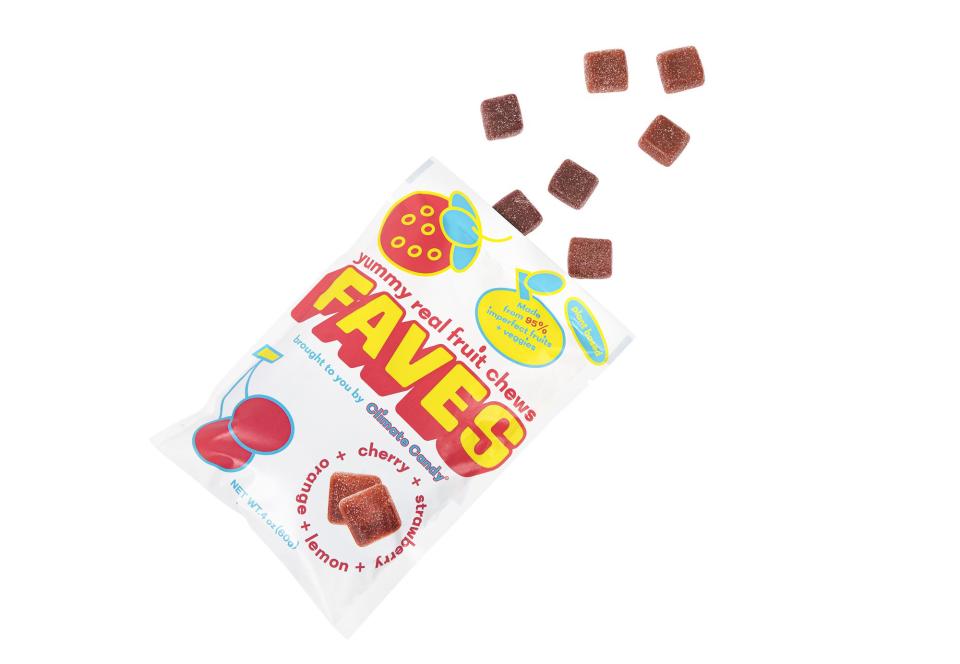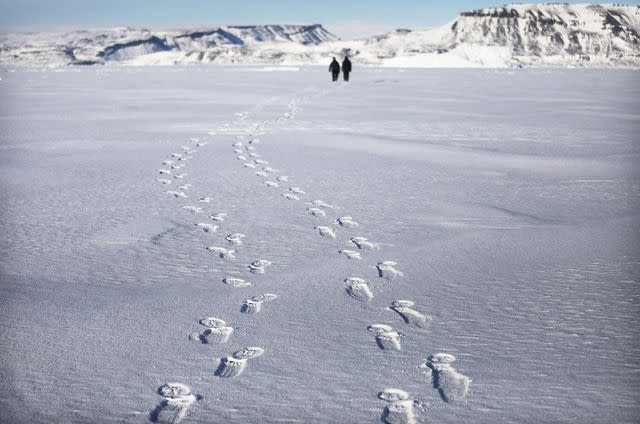Dum Dum Lollipop Heiress Turns Surplus Fruits and Veggies Into 'Climate Candy' Sensation
Climate Candy CEO Amy Keller explains how FAVES, fruit-flavored, plant-based treats made with "perfectly imperfect" produce, is making a difference for the planet

Looks do matter, at least when it comes to beets, carrots, apples and other fruits and vegetables.
A whopping 20 billion pounds of misshapen produce deemed too "ugly" to be displayed in grocery stores around the world go to waste each year, according to Feeding America.
Though packed with nutrition, these unwanted fruits and vegetables are left in farmers' fields or sent to landfills, where they decompose and produce methane, one of the most potent gases heating the planet to dangerous levels.
Amy Keller came up with a sweet solution.
In 1906, her family founded the Spangler Candy Co., maker of nostalgic treats such as Circus Peanuts, Sweethearts and 2 billion Dum Dums a year, making it the largest lollipop manufacturer in the world.
Keller, who had her first Dum Dum when she was 1 year old — and whose favorite flavor is the mystery pop — is adding to her family's legacy with a new creation: FAVES by Climate Candy, her own brand of healthy, eco-friendly sweets.
Made from "perfectly imperfect" but "perfectly good" misshapen fruits and vegetables, FAVES are delicious, nutritious and good for the planet, says Keller, Climate Candy's co-founder and CEO.
With flavors such as cherry, strawberry, lemon and orange, "when people try FAVES, they can't believe they're made out of fruits and vegetables," Keller tells PEOPLE.
The sweetness comes nothing else, she says. "We've told people, 'We imagine a world where fruits and vegetables taste like candy,'" she adds.
But that's not all. FAVES, which stands for "Fruit and Vegetable Sweets," is helping to fight the climate crisis. It says so right on the candies' sustainable wrappers: "We did it. We turned problems into candy, and now you can eat them."
"Unharvested produce," the packaging reads, "wastes vital energy and contributes to climate change."
For more about Climate Candy and how to reduce food waste, subscribe now to PEOPLE or pick up this week's issue, on newsstands Friday.
Keller started thinking about ways to use all that unharvested produce when she visited the Global Seed Vault in Svalbard, Norway, in 2018 with Kevin Wall — who produced the Live Earth climate benefit concert with The Climate Reality Project founder, former Vice President Al Gore — and Wall's wife, Dr. Susan Smalley, co-founder with her husband of PTK Capital.
Related:Al Gore Says 'We Have the Solutions We Need to Solve the Climate Crisis' on Earth Day 2020
"We went there to learn about food security, and I witnessed the United Nations installing generators, due to climate change, to keep the glaciers refrigerated for all of the seeds that feed the world," Keller says.
"While I was on the trip, I was also reading Drawdown: The Most Comprehensive Plan Ever Proposed to Reduce Global Warming by Paul Hawken," she continues. "So then I was learning about how 40% of food is wasted globally. And so really the company business plan came together while I was in the Arctic Circle."
With the help of her co-founders Wall and Smalley, Climate Candy was born.

"I knew there had to be a way to combine my passion for environmental issues and health with the family business creating sweet treats," says Keller, a longtime climate activist and seven-time Ironman triathlete.
"I was determined to create a business that could make a contribution to the planet and make a positive impact on people's lives and health while still allowing indulgence and the enjoyment we get from candy," she adds.
FAVES, says Keller, "gives people the opportunity to positively impact the world."
By rescuing about 2.2 million fruits and vegetables a year, Climate Candy is reducing food waste by preventing unharvested produce from festering in landfills, according to Keller.
Related:Oceans Have Saved Us From the Worst of Climate Change So Far - Now We Must Save the Oceans
"If we could just cut food waste in half, it would reduce our greenhouse gas emissions by 75 million metric tons every year," she says. That's a big number but, Keller adds, one person can make a difference.
Each packet of the plant-based candy that's consumed "means you've rescued this many beets, this many carrots, sweet potatoes, pumpkins, cherries, etc.," she explains.
With FAVES available on Amazon and other e-commerce sites such as Imperfect Foods, in retail stores such as Urban Outfitters, and at airport kiosks, it can add up quickly. They will be sold in stores such as The Vitamin Shoppe in June.
A 2-ounce package sells for $3.99; a 4-ounce packet is $4.99.
Climate Candy, which contains 96 percent imperfect fruits and vegetables, plans to introduce new flavors, too, including peach mango and blueberry raspberry.
Related:Jimmy Fallon to Plant a Tree for Dr. Jane Goodall for Her 'Trees for Jane' Campaign
So what would Keller's late grandfather, Norman Spangler, a second-generation leader at her family's iconic candy company, say about his self-described "disruptive granddaughter?"
"The fact that we have the ability to instill fun and color into any moment with what we're doing is the same as when I was trading Dum Dums at the lunch table as a kid," she says. "It's just that brief moment of joy and nostalgia."
She remembers advice she once got from her grandfather, who told her "not to eat the profit," she says. "But that's really hard when you own a candy business."
For more People news, make sure to sign up for our newsletter!
Read the original article on People.

